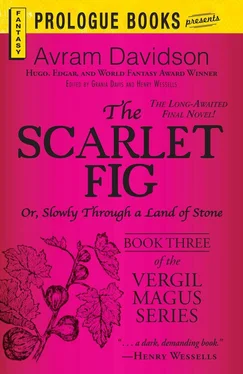Now see and hear Captain Plauto stoop and stare up into the face of Festus. “Well, that let’s you off — nary sword-slash do I see!”
Loud laughter.
The serjants-at-mace returned from below decks, from the way they furtively wiped their beards and from the sad, sour smell of them, one assumed that the ship’s wine had been broached and hospitality (one would not wish to say: gratuity) given; Festus tugged at his belt, half-turned to go, turned back. “Come ashore with us, Doctor, and taste our victuals. Meet the Viceroy. See the Trogs … we don’t oft have any here to see …”
Plauto said, “Go, Doctor, do. We’ll see you ashore and bring you back with us, no fear we’ll leave you for the Troglodytes to eat!”
He had not thought to go ashore, but it hardly seemed tactful to refuse; the Viceroy was, after all, in the place of the roy , the king, the Emperor, and one did not want to cause a question to arise.
The victuals were much as Vergil had thought that they would be, and so was almost everything else. One thing only he had not expected. Now to visit the Viceroy, Festus had said. He must have had an influence with his superior for which rank alone would not suffice, that he had merely walked into the man’s office, taking Vergil with him by the arm. Influence, however, or not, he (and his visitor) stood stock-still once they were a pace or two inside the door; for someone else was there before them. Standing with one hand on the viceregal chair almost as though posing for a sculptor was the viceroy himself, and he had the stiff look of one who has learned very successfully to control his passions but not to like doing so. Someone was facing him, and Vergil knew this one at once, was almost paralyzed to see him now and here … not with fear but with astonishment; protocol forbade that he should at the moment move or speak, but he doubted he could in any event have moved or spoken.
Even the most intense of confrontations produces its moment of silence, its moments, and this one was almost at once broken — not by the entrance of Festus and Vergil, but by its own weight and measure: silence could not bear the emotion of the one who next spoke. “We are against Rome ,” the man said, “because Rome is against Nature! Three times it is that you have destroyed our city and from even before that you have tried to bar the whole world from us; how have you dared? Juno designed that our city, and not yours, ” what hatred and contempt and barely-controlled rage lay in that one word, yours , “be the center of the world, and she gave us tokens that this should be so, she gave us her armor and her chariot: to no other city in the world did she do this, only to Carthage she did this.” He was a huge man with a huge chest and as he spoke the word Carthage he seemed to grow huger and as he took in deeper breaths the vastness of his chest became even more apparent, and his color went deeper and took on more and more of that red color which was the meaning of the word Punic , his eyes were bledshotten, almost he trembled and in another moment he would tremble. “ Where is her armor and where is her chariot? If not for certain Carthagans abroad who bought — and for no small sums, I inform you — one wheel of her chariot and one heel-piece of her armor,” here he did tremble, his deep voice trembled, his arms and his legs twitched: thus might a man behave in the presence of his enemy and adversaries: not that he feared of them, but that he was so in rage of them — “if not for that, we should have nought relish and nought taste of our lady Ishterah, Juno as she is also called: Juno! But I tell you, though you have expelled Nature as with a pitchfork, yet she shall always return. This sole wheel shall have a mate, and those twain wheels shall bear a holy chariot and this chariot shall bear the lady’s image, clad in mail, the length of every street in Rome through which a chariot may pass, and this heel-piece of her armor shall trample every snake in Rome — now go!” Great must have been the self-control of him, that his voice neither trembled nor broke when he flung out the words, Now go!
And he himself went.

Much loved of Juno, ancient Carthage, stained with purple, and heavy with gold. Thrice indeed had Rome destroyed that city; and now, it seemed, a fourth time, again it was rising and again it spoke defiance. Was it so that Juno still hated Mars, the father of Romulus? What boded this for the pax Romana, and all who dwelt within the Empery of Rome? Much loved of Juno….

And after the polite recital of, if you are well then I am well and it is well, the viceroy asked, still formal, “Is there anything which I can do for you, Doctor Vergil?”
“Lord Viceroy … the Lord Viceroy can tell me if that man just now here … is he not called Hemdibal? Might I not have seen him in Corsica?”
By the calm tone of the viceroy they might have been speaking of some superannuated senator; “I am sure that he has many names and is seen in many places. I sent for someone to explain to me the presence of certain ships in the circumjacent sea, and there came this one. ‘Hemdibal’? No such name it was he said. He said he is Josaias, King of Carthage.”

More for the sake of having something to do in order to distract his mind from the discomfort of the ship’s motion (do what he might, he could not rid himself of the very deep feeling that it was an irrational motion, that the sea ought to be as firm as the land: this was the common Roman notion, more-or-less, for the Romans did not love the sea), he began seeking and searching if there were things in his pouch which he might shift to his budget — that staunch old doe-skin budget — or things in his budget which he might shift to his pouch — poke , they had called it at home, Some thief slit the thongs and made off with the poke, may curs devour his collions! And in so doing he, Vergil, came upon a small piece of sheepskin with the fleece-side inside. Instantly he was again in Verona, where he had gone to speak with Sparga, the great Sparga, the only man of whom it was said, by name, that he had made a homuncule; Sparga illa , that one.
Sparga had not much wanted to talk about the homuncule. “The experiment was, philosophically speaking, a success. But the experience was a shock. Endeavor thee not to make homuncules, Messer Vergil, thou philosophe, thee.”
“It must have been a great wonder,” said that philosophe, he, reluctant to leave the subject.
Sparga, his face like some low range of mountains seen from a higher peak in the dry season when all is sere and stark, said, “Here is a wonder.” And placed a patch of cloth in his hand, tumbling out the contents. “Do you take especial interest in gold, ser? Most men do.”
There were the two rings, of the palest yellow metal, scarcely might he believe that they were gold. Sparga the alchemist was reading his doubts upon his face. “This is not true gold, Messer Vergil, this is electrum, and electrum of a very special kind. Short of scraping somewhat of the metal itself, which I am loath to do as it would damage, and putting the scrape to the assay by fire and crucible, a precise analysis is not possible. Neither would it yield to the touchstone. But there is very good reason otherwise to say the substance of the rings consists in 67 parts of gold to 31 parts of silver; some say that the other two parts are of simple copper-bronze — as though bronze itself is so simple and there were not a muckle formulas for bronze. However, others say,” and here a smile as thin as a ray of winter sunlight passed swift over the craggy countenance of the occamyst; Vergil had a sudden insight, a sudden insight: knew that others was a modest obliquity for the name of Sparga himself; “… others say that the two lesser parts are orichalchion, that mysterious ore of copper itself tinctured somehow with gold, there in the distant mountain matrix of Eva, the lands of Greece. Wizard’s Electrum , it is called, this semplum of which the twain rings are wrought. You may examine them. Do.” And Vergil picked up one, and then the other. The first was wrought in a design of great extension and complexity, as it were some serpentine thing coiling in and out and roundabout and just as the eye thought it had discerned an end and a beginning, lo! the eye was fain admit itself wrong: yet ever the seeking mind was convinced that an end there was, and a beginning, eke.
Читать дальше












